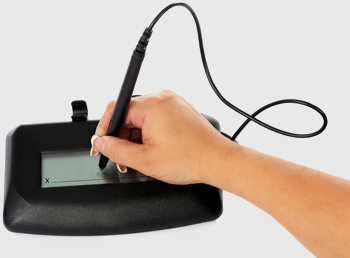
Electronic signature or e-signature technology is an efficient tool for businesses to simplify the task of contract signing. An electronic signature is the electronic equivalent of a handwritten signature. Here the contents of an electronic message are adopted through any of the electronic means such as mobile phones, tablet PCs, e-signature Pads, or writable screens. There are some specific reasons why businesses adopt e-signature technology.
- Legally valid just as a handwritten signature: E-signature is given equal validity as handwritten signature as per U.S. Federal ESIGN Act signed by President Bill Clinton in the year of 2000.
- Safe and secure: Documents that contain electronic signatures are more secure than their paper counterparts. Paper documents often contain details regarding the person who signed the contract, and may include the purpose for which he signed the contract. Such documents can be easily lost, stolen or forged or even subjected to unauthorized tampering. Electronic records are more secure, as they are encrypted or authenticated before storage.
- Compatible with almost all business platforms: Most of the e-signature transaction platforms are compatible with business tools such as Microsoft Word, Google Docs, Dropbox, Salesforce and many more. When selecting a document scanning company, check for the list of compatible products and platforms.
- Time saving: In traditional paper-based documents, it may sometimes take a week or more to get the document signed and returned. Such delays can be greatly addressed with e-signature technology.
- Flexible: Documents signed with e-signature technology are more flexible, as it can save time, avoid manual processing errors, re-keying of data, and printing, signing, scanning and emailing of agreements without the benefit of auto notification.
Anyhow, e-signature technology is not without its share of demerits. Cost of hardware, the risk of theft when using electronic tablets, the space required to store signature devices, etc are some of the major issues that limit the widespread use of this technology.
On a different note, the document scanning and conversion requirements of a business do not end with scanning a signature. There will be a lot of other documents in the form of images and paper that require scanning and indexing. Associating with a document conversion company is the practical option to address various document conversion challenges and meet all scanning needs efficiently.



